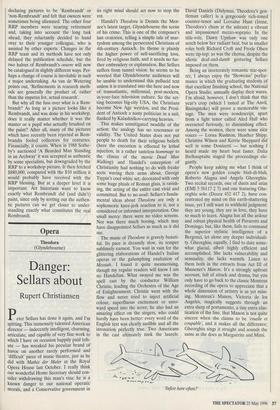Opera
Theodora (Glyndebourne)
Danger: Sellars about
Rupert Christiansen
Peter Sellars has done it again, and I'm spitting. This immensely talented American director — indecently intelligent, charming, articulate, and capable of very fine work to which I have on occasion happily paid trib- ute — has wreaked his peculiar brand of havoc on another rarely performed and 'difficult' piece of music theatre, just as he did with Mathis der Maier at the Royal Opera House last October. I really think our wonderful Home Secretary should con- sider withdrawing this man's visa: he is a known danger to our national operatic morals, and a Conservative government in its right mind should act now to stop the rot.
Handel's Theodora is Dennis the Men- ace's latest target, Glyndebourne the scene of his crime. This is one of the composer's last oratorios, telling a simple tale of mar- tyrdom among the persecuted Christians of 4th-century Antioch. Its theme is plainly the higher power of self-sacrificing love, fired by religious faith, and it needs no fur- ther embroidery or explanation. But Sellars suffers from tunnel vision: he seems to be worried that Glyndebourne audiences will be unable to understand this pellucid text unless it is translated into the here and now of transatlantic, millennial, post-modern, in-your-face television culture. So the set- ting becomes big-city USA, the Christians become New Age weirdos, and the Presi- dent of Antioch a nasty politician in a suit, flanked by Kalashnikov-carrying heavies.
This makes unmitigated twaddle of the action: the analogy has no resonance or validity. The United States does not put people to death for their religious beliefs (here the execution is effected by lethal injection, in a rather tasteless hommage to the climax of the movie Dead Man Walking) and Handel's conception of Christianity had nothing to do with freaky sects waving their arms about. George Tsypin's cool white set, decorated with only some huge phials of Roman glass, is ravish- ing, the acting of the entire cast vivid and committed. But to no avail: Sellars's funda- mental ideas about Theodora are only a sophomoric knee-jerk reaction to it, not a considered or informed interpretation. One small mercy: there were no video screens. Nor was there much booing, which may have disappointed Sellars as much as it did me.
The music of Theodora is gravely beauti- ful. Its pace is dreamily slow, its temper sublimely earnest. You wait in vain for the glittering elaborations of Handel's Italian operas or the galumphing exultation of Messiah. I found it quite mesmerising, though my regular readers will know I am no Handelian. What swayed me was the spell cast by the conductor William Christie, leading the Orchestra of the Age of Enlightenment. Christie went with the flow and never tried to inject artificial colour, superfluous excitement or unto- ward speed into the score; he also had an amazing effect on the singers, who could hardly have been better: every word of the English text was clearly audible and all the intonation perfectly true. Two Americans in the cast ultimately took the laurels: David Daniels (Didymus, Theodora's gen- tleman caller) is a gorgeously rich-toned counter-tenor and Lorraine Hunt (Irene, Theodora's chum at the ashram) a vibrant and impassioned mezzo-soprano. In the title-role, Dawn Upshaw was only one notch below her radiant best, but in smaller roles both Richard Croft and Frode Olsen were tip-top: so was the chorus, despite the idiotic deaf-and-dumb gesturing Sellars imposed on them.
Being an inveterately romantic star-spot- ter, I always enjoy the 'Showcase' perfor- mance in which the graduating students of that excellent finishing school, the National Opera Studio, annually display their wares. I'm afraid, however, I don't think that this year's crop (which I tasted at The Anvil, Basingstoke) will prove a memorable vin- tage. The men were nondescript, apart from a light tenor called Aled Hall who overacted furiously, to diminishing effect. Among the women, there were some nice voices — Lorna Rushton, Heather Shipp, Christina Wilson and Kerrie Sheppard did well in some Donizetti — but nothing I heard made my heart beat faster. Dalia Ibelhauptaite staged the proceedings ele- gantly.
People keep asking me what I think of opera's new golden couple blah-di-blah, Roberto Alagna and Angela Gheorghiu. Two recital records, one of duets and arias (EMI 5 56117 2 7) and one featuring Ghe- orghiu solo (Decca 452 417 2), have con- centrated my mind on this earth-shattering issue, yet I still want to withhold judgment: they are young, they are in love, they have so much to learn. Alagna has all the ardour and robust physical health of Pavarotti and Domingo, but, like them, fails to command the superior stylistic intelligence of a Bergonzi, let alone any deeper individuali- ty. Gheorghiu, equally, I find to date some- what glacial, albeit highly efficient and accomplished. She lacks vulnerability and sensuality, she lacks warmth. Listen to them both in the extracts from Act III of Massenet's Manon. It's a strongly upfront account, full of attack and drama, but you only have to go back to the classic Monteux recording of the opera to appreciate that a whole dimension of artistry is as yet miss- ing. Monteux's Manon, Victoria de los Angeles, magically suggests through an extra slurp of portamento, a tiny extra elas- tication of the line, that Manon is not quite sincere when she claims to be `cruelle et coupable', and it makes all the difference; Gheorghiu sings it straight and sounds the same as she does as Marguerite and Mimi.
'Infest here often?'


























































 Previous page
Previous page